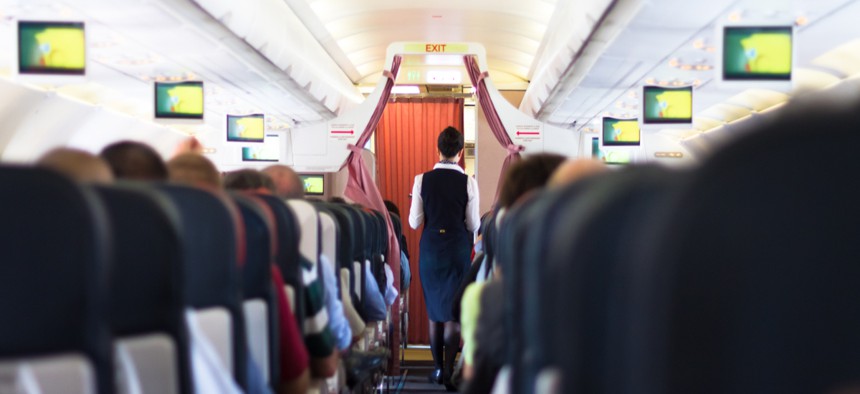Transportation to Start Tracking Sexual Harassment of Travelers Under New Bill

Matej Kastelic/Shutterstock.com
The bill calls for certain airlines and railroads to track harassment and assault of their workers and passengers and report incidents to the Transportation Department.
The chairman of the House Committee on Transportation and Infrastructure unveiled new legislation this week to track sexual assault and harassment incidents that occur across multiple modes of American transportation.
The Stop Sexual Assault and Harassment in Transportation Act introduced by Rep. Peter DeFazio, D-Ore., mandates specific transportation carriers—including certain passenger airlines and railroads, transit agencies, cruise ships, bus companies and ridesharing companies—to implement new, formal policies, training for personnel and reporting mechanisms for victims and also directs the Transportation Department to collect and share data on reports of such cases.
“Unfortunately, sexual assault and harassment occurs all too often to the employees of transportation providers and individuals who are traveling, and more must be done to protect them,” DeFazio said.
Such incidents on various passenger transportation modes has garnered greater attention following the #MeToo movement, and numerous accounts and lawsuits have been bubbling up across the nation. According to a survey from 2018, of more than 3,500 flight attendants working across 29 U.S. airlines, 68% said they experienced sexual harassment during their flying careers and 18% experienced physical sexual harassment. Of those who underwent such incidents, only 7% reported it to their employers.
In the first 180 days following the legislation’s passage, certain transportation entities would be expected to work with relevant labor unions to create policies that firmly indicate that “no transportation sexual assault or harassment incident is acceptable under any circumstance” and develop training for workers on how to respond when such cases occur. The bill also calls for the establishment of new procedures for personnel to follow when cases are reported, others that enable appropriate public outreach on the issue and means for victims to confidentially report their experiences over the phone and online.
Within the first year of enactment, the Transportation Department would be required to create a program to annually collect and maintain data on incident reporting to law enforcement and the transportation entities, including the number of incidents reported to be committed specifically against passengers and travelers. The information would be expected to preserve individuals’ privacy and be made available on the department’s public website. To help prevent and punish perpetrators, certain passenger vessels also would be directed to institute video surveillance “where a person has no reasonable expectation of privacy” and keep footage for at least 90 days after the voyage. Access to the surveillance will be extremely limited and if sexual harassment or assault is reported, the FBI would determine what footage is relevant and need to be preserved for at least 5 years.
The bill also would direct Transportation’s inspector general to evaluate entities’ compliance and reporting of such incidents mandated in the act, no later than 18 months after it’s enacted—and again every two years thereafter.
“In transportation, the number one priority is safety,” DeFazio said. “That means not only getting the traveling public to their destination safely but also ensuring their safety throughout the trip.”
A variety of groups, including the American Association for Justice, National Center on Sexual Exploitation, Survivors for Solutions, and others expressed their support for the bill. The president of the Association of Flight Attendants, which completed the survey mentioned above and represents 50,000 flight attendants across 20 airlines also said it should be a “no brainer” for Congress members who want to protect their constituents to sign and pass the legislation.
“It’s not enough to say sexual harassment and assault is wrong; we need concrete actions to stop it, respond with victim support, engage every stakeholder, set a clear tone of zero tolerance from leadership and deter perpetrators with clear consequences for their actions,” the association’s leader Sara Nelson said.
DeFazio introduced similar legislation in Congress last year, though it didn’t move out of subcommittee.






